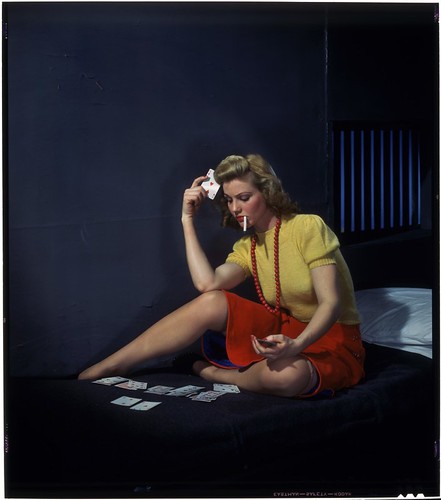 Picture via George Eastman House (The Commons on Flickr)Have you ever read a book that had a protagonist you just didn't like? Did you keep reading?
Picture via George Eastman House (The Commons on Flickr)Have you ever read a book that had a protagonist you just didn't like? Did you keep reading?
For me this is a tough one to answer. I read books for characters. Sure, there are the occasional situations where a story is all plot and still hooks me in (these are usually blockbuster action movies, for the record), but for the most part, I want to connect with the people. So when I start reading a book and don't really like the characters, it can be a challenge for me to stick with it.
Which got me to thinking, what makes a character sympathetic? And do we necessarily have to like a character in order to enjoy the book? Scarlett O'Hara, Anne Rice's Lestat, Severus Snape in Harry Potter, Eric in the Sookie Stackhouse/True Blood books, Damon in Vampire Diaries, and Sue in Glee aren't very nice people usually, yet somehow stand out as great characters that are hard not to be drawn to. Why?
Because somewhere along the way we find ourselves sympathizing or understanding them. In Glee, Sue is ruthless, vindictive, bigoted, and mean to children. Yet, in one episode we see her fall for a co-worker then get her heart broken, showing that she is capable of love and is probably extremely lonely. It isn't enough to completely redeem her, but it gives the viewer a sign that there are reasons why she is the way she is--her motivation.
And therein lies the key. If your character is going to act in a way that isn't very likable, you have to eventually clue the reader in as to why they act that way.
Along with creating proper motivation, there are some things you want to avoid in creating sympathetic characters...
Do not make your character perfect
--A character who is totally pure of heart, volunteers with children, donates all her money to charity, wakes up looking beautiful, and is always kind to animals does not a sympathetic character make. Readers can't connect to perfect.
Keep whining to a mimimum
--A protagonist who complains and whines and constantly plays victim is just plain annoying. Readers will root for her execution instead of her success.
A do-nothing
--A hero/heroine no matter how flawed must take action. If the character lets everything happen and doesn't try to do something, then the reader will not be very sympathetic. We like to read about those who are willing to help themselves.
Tread carefully with snobbery or bitchiness
--You can have a bitchy character (i.e. Scarlett O'Hara) but it has to be worked carefully. There has to be that motivation of why they are so abrasive. And no matter what the motivation, if you MC is a shrew all the time, the reader will be turned off.
Beware the cliched sympathy tricks
--Showing your tough as nails hero being kind to children, elderly, and small animals is not adequate. And don't have other characters talk about how wonderful your character is to develop sympathy. Your readers will see through those tired ploys.
Don't throw in some "aren't I awesomely good?" scene that isn't related to the story
--Don't put your MC volunteering at the homeless shelter to show their soft side unless something is going to happen at that shelter to forward the plot
Make the backstory believable
--Don't tack on a whole bunch of awful events just to create sympathy. The backstory, like everything else, needs to be an organic, integrated part of the book. In my opinion, you should not be able to write the book without already knowing your character's backstory upfront. Their history is who they are and will affect every aspect of how they interact in the book. If you write the whole book, then go back and throw in a child abuse backstory to help explain the character's shortcomings, it will show.
Be careful waiting until page 150 to start developing the sympathetic side of your character.
--If you don't offer some morsel for your reader to hold onto, many will give up the book before they get to the "good part". Like I mentioned above, the current book I'm reading has me hanging on because of some foreshadowing and few redeeming moments, but without those ,I probably would have moved on to another book.
So how about you? Have you ever read a book that you just couldn't sympathize with the protagonist? Did you keep reading? Who are some of your favorite anti-heroes (can't help but like them even though they are far from great people)?